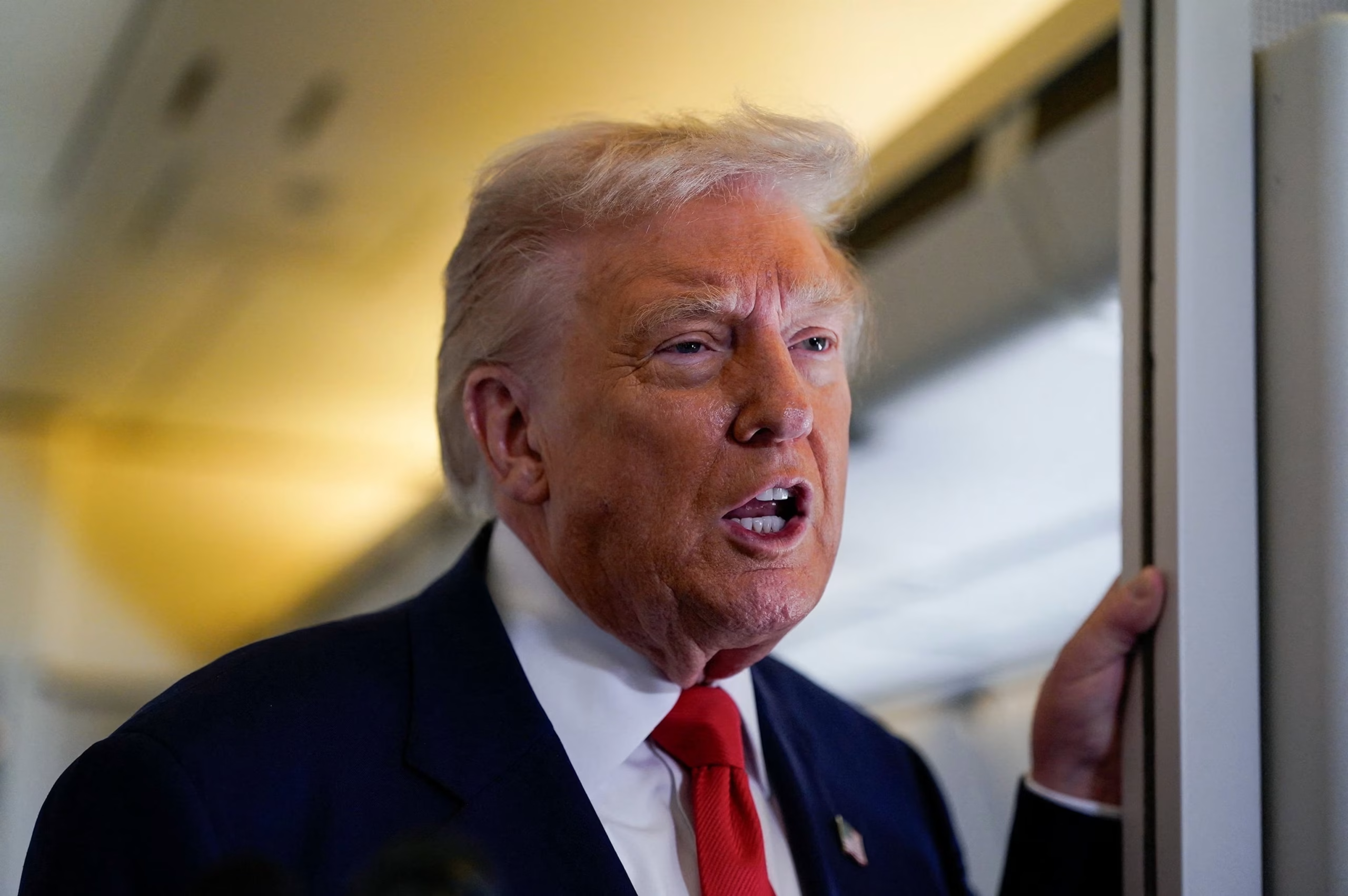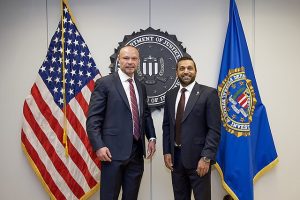President Donald Trump says he has “sort of made up” his mind on how the United States will proceed in confronting the Maduro regime in Venezuela, following a week of intensive meetings with top military and intelligence officials. Although Trump did not disclose the specific action he intends to take, he suggested that a major policy shift may soon be announced.
Speaking to reporters aboard Air Force One, Trump indicated that recent U.S. operations targeting narcotics smuggling have reshaped the administration’s broader strategic approach.
“I sort of made up my mind,” Trump said, according to The Hill. “I can’t tell you what it is, but we made a lot of progress with Venezuela in terms of stopping drugs from pouring in.”
His comments come as the administration escalates both its rhetoric and its operational tempo in the Western Hemisphere. Trump and senior officials have repeatedly labeled Nicolás Maduro an “illegitimate leader,” accusing him of allowing Venezuela to become a central hub for narcotics trafficking — an accusation Maduro has consistently rejected.
Series of High-Level Briefings Signal Escalation
Throughout the week, Trump received classified briefings at the White House from Defense Secretary Pete Hegseth and the Joint Chiefs of Staff. The sessions reportedly outlined various U.S. options toward Venezuela, including possible land-based military strikes, according to senior administration officials familiar with the discussions.
This is not the first time military action against Venezuela has been considered during a Trump presidency, but advisers say the tone and substance of recent briefings reflect a “significant departure” from prior years.
Officials emphasize that no decision has been announced but note that the president has been increasingly assertive in internal discussions.
“He is very decisive right now,” one official said. “There is a sense inside the building that something major is coming.”
Expanded Maritime Operations: Strikes on 20 Vessels
Since early September, U.S. forces have intensified operations in the Caribbean and eastern Pacific, targeting what the administration describes as “narco-terrorist” vessels linked to criminal networks operating out of or through Venezuelan waters.
According to Pentagon officials, U.S. ships, aircraft, and special operations units have:
-
Destroyed or disabled at least 20 vessels
-
Killed an estimated 80 individuals aboard those vessels
-
Identified and surveilled an additional network of maritime targets
Administration officials describe the casualties as cartel-linked operatives involved in narcotics trafficking. Human rights groups, however, have expressed concern about the lack of public evidence supporting those characterizations, noting the opacity surrounding the rules of engagement.
Despite those concerns, federal officials maintain that the maritime campaign has been successful in limiting trafficking routes.
Growing U.S. Military Presence in the Region
The stepped-up operations coincide with a substantial expansion of U.S. military assets assigned to the U.S. Southern Command (Southcom). Over the past two months, the administration has deployed:
-
Naval warships and cruisers
-
U.S. Marine expeditionary units
-
Fighter aircraft and reconnaissance platforms
-
Advanced surveillance and signals intelligence systems
Officials say the deployments are intended to “starve” narcotics networks of operational space and apply maximum pressure to Maduro’s inner circle.
“We are in the Western Hemisphere to safeguard American national security,” a senior Pentagon official said. “That includes shutting down transnational threats—drug cartels, terror networks, and state actors who enable them.”
Operation Southern Spear: A New Military and Intelligence Campaign
On Thursday, Defense Secretary Pete Hegseth officially announced Operation Southern Spear, a new initiative targeting “narco-terrorist” groups across the Southcom region. He described it as a coordinated military, intelligence, and diplomatic effort aimed at dismantling criminal networks that operate across maritime and land borders.
According to Hegseth, the operation will integrate:
-
Expanded joint military intelligence collection
-
Coordinated maritime interdiction operations
-
Precision strikes against high-value narcotics targets
-
Broader diplomatic pressure on regional governments
Administration officials say Operation Southern Spear represents the “most aggressive” U.S. security initiative in the region in decades.
The Hill reported that internal documents describe the operation as essential for preventing “large-scale narcotics flows from reaching the U.S. mainland” and neutralizing “transnational networks that pose strategic threats.”
Trump Suggests Maduro’s ‘Days Are Numbered’
During a recent appearance on CBS’s 60 Minutes, Trump suggested that Venezuelan President Nicolás Maduro may face severe consequences in the near future.
Asked about Maduro’s grip on power, Trump replied:
“His days are numbered.”
The comment quickly drew global attention. Maduro has faced both domestic and international challenges to his legitimacy, but few U.S. presidents have publicly suggested imminent action with such bluntness.
Diplomatic observers note that Trump’s phrasing was unusually direct, even for him—and may reflect the depth of frustration within the administration.
Maduro’s Reported Pleas for Relief
According to administration officials and recent media reports, Maduro has made repeated attempts—some in public, others through back-channel intermediaries—to persuade Washington to halt the maritime strikes.
Trump himself referenced these alleged overtures during a press event at the White House with Ukrainian President Volodymyr Zelensky.
Reporters asked Trump about the claims that Maduro had offered concessions.
“It’s been reported that Maduro offered everything — all the natural resources,” one journalist said. “He even recorded a message in English offering mediation. What could he do to stop the U.S. operations?”
Trump’s response was unfiltered:
“He has offered everything. You’re right. You know why?”
“Because he doesn’t want to f*** around with the United States.”
The remark elicited audible reactions from reporters and underscored the gravity of the standoff.
Maduro Appeals to International Figures, Including the Pope
Facing sustained U.S. military pressure, Maduro has reportedly sought diplomatic mediation through foreign allies and religious leaders. Among those approached is Pope Leo XIV, whom Maduro praised publicly earlier this month.
“I have great faith that Pope Leo will help Venezuela preserve peace and stability,” Maduro said, referencing a letter he sent requesting the Vatican’s involvement.
Diplomatic analysts note that appeals to the Vatican often reflect a leader’s desire to demonstrate openness to negotiation, even if substantive progress remains unlikely.
Regional Leaders Brace for Potential Aftershocks
Latin American governments are watching developments closely. Several neighboring countries fear that heightened U.S.-Venezuela tensions could destabilize the region, trigger refugee outflows, or disrupt trade routes.
Colombian and Brazilian officials have reportedly engaged in quiet talks with U.S. diplomats urging caution, though the administration has insisted its moves are “targeted, strategic, and necessary.”
Privately, some regional diplomats worry that a large-scale U.S. strike could spark broader confrontations involving paramilitary groups aligned with the Maduro regime.
Uncertain Road Ahead
For now, Trump has offered only hints at what comes next, emphasizing that he has “sort of made up” his mind. Officials close to the president say a final decision could be announced “within weeks.”
Whether the next phase involves expanded interdiction operations, targeted strikes, more sanctions, or diplomatic maneuvering remains unclear.
But one thing is evident: U.S. policy toward Venezuela is entering a new and more aggressive chapter—one that could reshape the geopolitical landscape of the Western Hemisphere.

Emily Johnson is a critically acclaimed essayist and novelist known for her thought-provoking works centered on feminism, women’s rights, and modern relationships. Born and raised in Portland, Oregon, Emily grew up with a deep love of books, often spending her afternoons at her local library. She went on to study literature and gender studies at UCLA, where she became deeply involved in activism and began publishing essays in campus journals. Her debut essay collection, Voices Unbound, struck a chord with readers nationwide for its fearless exploration of gender dynamics, identity, and the challenges faced by women in contemporary society. Emily later transitioned into fiction, writing novels that balance compelling storytelling with social commentary. Her protagonists are often strong, multidimensional women navigating love, ambition, and the struggles of everyday life, making her a favorite among readers who crave authentic, relatable narratives. Critics praise her ability to merge personal intimacy with universal themes. Off the page, Emily is an advocate for women in publishing, leading workshops that encourage young female writers to embrace their voices. She lives in Seattle with her partner and two rescue cats, where she continues to write, teach, and inspire a new generation of storytellers.









